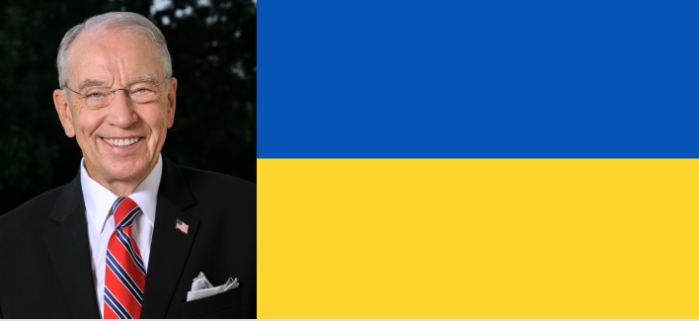While testifying before the U.S. House Intelligence Committee on November 21, former National Security Council official Fiona Hill urged Congressional Republicans not to “promote politically driven falsehoods that so clearly advance Russian interests.” She was referring to the idea that “Russia and its security services did not conduct a campaign against our country—and that perhaps, somehow, for some reason, Ukraine did.” Hill added, “This is a fictional narrative that has been perpetrated and propagated by the Russian security services themselves.”
Meanwhile, “American intelligence officials informed senators and their aides in recent weeks that Russia had engaged in a yearslong campaign to essentially frame Ukraine as responsible for Moscow’s own hacking of the 2016 election,” Julian E. Barnes and Matthew Rosenberg reported for the New York Times on November 22, citing three officials familiar with the classified briefing.
Nevertheless, U.S. Senator Chuck Grassley persisted.
As evidence mounts that President Donald Trump abused his power by pressuring Ukraine to boost his domestic political prospects, Grassley has advanced the narrative that Ukrainian government officials interfered in the 2016 election to support Hillary Clinton and undermine Trump.
From the earliest months of Special Counsel Robert Mueller’s investigation, Grassley used his position as Senate Judiciary Committee chair to develop “a counter-narrative to the Trump-Russia storyline by conducting a series of alternative investigations into tangential subjects.” To that end, Grassley wrote to Deputy Attorney General Rod Rosenstein in July 2017, citing “apparent evidence of collusion between the DNC, Clinton campaign, and Ukrainian government.” His inquiry centered on Alexandra Chalupa, a Ukrainian-American who had a consulting contract with the Democratic National Committee.
Barnes and Rosenberg explained in their article for the Times,
The accusations of a Ukrainian influence campaign center on actions by a handful of Ukrainians who openly criticized or sought to damage Mr. Trump’s candidacy in 2016. They were scattershot efforts that were far from a replica of Moscow’s interference, when President Vladimir V. Putin ordered military and intelligence operatives to mount a broad campaign to sabotage the American election. […]
This time, Russian intelligence operatives deployed a network of agents to blame Ukraine for its 2016 interference. Starting at least in 2017, the operatives peddled a mixture of now-debunked conspiracy theories along with established facts to leave an impression that the government in Kyiv, not Moscow, was responsible for the hackings of Democrats and its other interference efforts in 2016, senior intelligence officials said.
The Russian intelligence officers conveyed the information to prominent Russians and Ukrainians who then used a range of intermediaries, like oligarchs, businessmen and their associates, to pass the material to American political figures and even some journalists, who were likely unaware of its origin, the officials said.
Grassley no longer chairs the Judiciary Committee, but as Senate Finance chair he continues to pursue the Ukrainian election interference storyline.
Last week, he and fellow Republican Senator Ron Johnson, who chairs the Homeland Security Committee, wrote to the U.S. archivist, Attorney General William Barr, and FBI Director Christopher Wray seeking documents related to “collusive actions Chalupa and the DNC took to use foreign government sources to undermine the Trump campaign during the 2016 election.” Their correspondence (enclosed in full below) relies heavily on reporting by Kenneth Vogel and David Stern for Politico and by John Solomon for The Hill. Solomon was relegated to the opinion section last year after his own colleagues expressed concerns about his reporting. He’s now a Fox News contributor and left The Hill earlier this fall.
The whistleblower complaint that sparked the House impeachment inquiry referenced Solomon’s tendentious reporting. Witnesses in the impeachment hearings have “slammed Solomon’s series of articles [about Ukraine] for containing a tenuous connection to actual events.”
No one expects Iowa’s senior senator to give serious consideration to any articles of impeachment the House may approve against Trump. He will surely find a way to excuse all the president’s conduct toward Ukraine and obstruction of Congressional investigations.
But the least Grassley could do is not use his Senate position to facilitate a Russian disinformation campaign. Actions by “a handful of Ukrainians” who wanted Trump to lose in 2016 are not equivalent to the massive propaganda effort Russian operatives waged to influence American voters, with the Kremlin’s backing.
Appendix 1: November 22, 2019 letter from Senators Chuck Grassley and Ron Johnson to Attorney General William Barr and FBI Director Christopher Wray
Appendix 2: November 21, 2019 letter from Grassley and Johnson to David Ferriero, archivist of the United States
Appendix 3: July 20, 2017 letter from Grassley to Deputy Attorney General Rod Rosenstein

